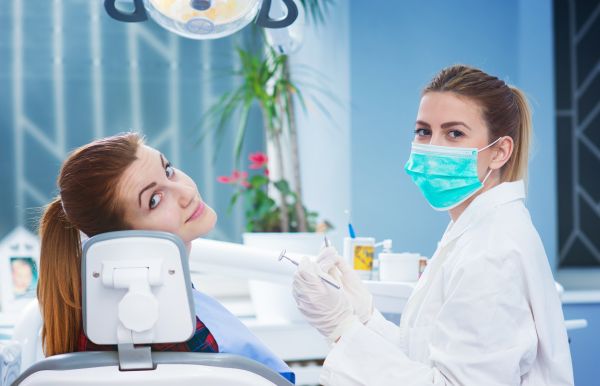Family Dentistry FAQ: Who Should Get an Oral Cancer Screening?

When unusual sores or bleeding appear in the mouth, or lumps or tenderness appear in the throat or neck, an oral cancer screening can determine whether further attention is needed. Oral cancer is a serious condition that will not go away on its own. However, with appropriate diagnosis from a family dentist and immediate treatment, it can have a very high survival rate, and these chances are improved with early detection.
What are the common symptoms of oral cancer?
Certain clues can help a person know whether there is enough concern to make an appointment for an oral cancer screening. These are the common symptoms to watch for:
- Visual or tangible ulcers, patches or lumps
- Broken tissues or unexplained bleeding
- Hoarseness or difficulty swallowing
- Pain anywhere in the mouth or neck
Is self-diagnosis enough?
If any of the above-mentioned symptoms are found, a dental appointment should be scheduled for further diagnosis. The absence of such symptoms, however, does not guarantee there is no problem. Self-diagnosis is not reliable, as a person cannot check everywhere in the mouth including the back of the tongue and throat and up between the gums and cheeks. Furthermore, if concerns are discovered, a person will require the assistance of a dentist to receive treatment.
How does a dentist check for oral cancer?
Someone finding any of the common symptoms should schedule an appointment with a family dentist to confirm the diagnosis. Along with a visual exam, a tool called a Velscope can help detect areas of concern. A 14-point examination will be performed to look for any signs of trouble. All of the soft tissues in the mouth to be examined include the cheek lining and mucosa, the gums, the tongue and the area below it, the tonsils, mouth sinuses, salivary glands, the hard and soft palette and inside the lip tissues.
A complete panel of X-rays can reveal whether there are ulcers or tumors hidden beneath the gum line or below the teeth. In addition, the neck and throat will be checked for lumps, tenderness or other abnormalities.
Is oral cancer preventable?
In some cases, the tendency to develop oral cancer may be heredity. The good news for many people is that to a great extent, the risk of developing this cancer can be lowered. Avoid drinking alcohol, which can produce toxins that damage DNA. Tobacco also contains at least 30 harmful chemicals that can cause oral cancer, so smoking cigarettes, pipes or cigars, or chewing tobacco are big risk factors.
Good nutrition can help, so eating a healthy and nutritious diet, especially fresh fruits and vegetables, is important. Of course, practicing a regular routine of good oral hygiene helps keep the mouth healthy, and regular dental exams and cleanings can ensure that any signs of worry can be checked in the earliest stages.
Conclusion
The first line of defense against mouth cancers is to take responsibility for your health by developing good habits and avoiding harmful ones. Beyond that, routine exams and oral cancer screening can help detect any problems early on, allowing a greater chance of successful treatment.
Are you considering oral cancer screening in the Albuquerque area? Get more information at https://familychoicedentistry.com.
Check out what others are saying about our dental services on Yelp: Oral Cancer Screening in Albuquerque, NM.
Related Posts
If you are thinking about wisdom teeth extraction, now might be the right time for this procedure. These third molars can create problems in the mouth, both cosmetically and for your health. It is often more sensible to take out the teeth before they ever emerge. Doing so can help you avoid many of the…
Wisdom teeth are notorious for not coming in well and leaving your mouth feeling crowded. There are other health concerns and cosmetic issues that can arise when these teeth are impacted. It should not be a surprise why dentists frequently recommend that these teeth come out, often before they erupt. If you decide not to…
Unlike other teeth, wisdom teeth do not show up until you are around age 20. Some people get them as early as age 17, while other people may not see them erupt until age 25. In either case, these third molars can cause troubling issues cosmetically and for your oral health. Your dentist will examine…
Dental crowns play a central role in modern restorative dentistry, offering durable protection for damaged teeth while restoring natural function. Anyone preparing for this treatment benefits from understanding the steps involved in the dental crown process and the advantages it provides.The dental crown process begins with an examination performed by a dental professional. During this…
